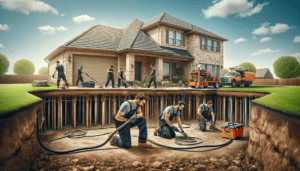What's going on down there?

Let's talk Abilene soil!
Abilene, Texas, is located in a region with a unique soil composition that can cause foundation failures. Many homeowners in the area experience foundation issues due to the expansive clay soils that are common in the region. In this blog post, we will discuss why foundations fail in Abilene, Texas, due to the soil composition.
Expansive Clay Soil
Expansive clay soil is a type of soil that expands and contracts depending on its moisture content. In dry conditions, the soil shrinks, and in wet conditions, it swells. This cycle of expansion and contraction can put significant stress on a foundation, causing it to shift, crack, or even fail. This is known as differential settlement, where one area of the foundation settles more than another.
Why Expansive Clay Soil is a Problem in Abilene, Texas
Abilene, Texas, is located in a region with a high concentration of expansive clay soil. The clay soil in the area is made up of tiny particles that can absorb and retain large amounts of water. When the soil absorbs water, it swells, putting pressure on the foundation. In dry periods, the soil shrinks, causing gaps to form between the soil and the foundation.
The constant cycle of expansion and contraction can cause the foundation to shift, crack, or fail. This is a significant problem in Abilene, Texas, where hot, dry summers and occasional heavy rainfall are common. These weather conditions exacerbate the soil’s expansion and contraction, putting additional stress on the foundation.
Preventing Foundation Failures
The best way to prevent foundation failures due to expansive clay soil in Abilene, Texas, is to take preventive measures. Here are some steps you can take to protect your foundation:
Install a Moisture Barrier: Installing a moisture barrier around the foundation can help prevent the soil from absorbing too much water. This can reduce the amount of pressure on the foundation and prevent it from shifting or cracking.
Install a Foundation Drainage System: A foundation drainage system can help prevent water from pooling around the foundation. This can reduce the amount of water that the soil absorbs, reducing the pressure on the foundation.
Use a Deep Foundation: A deep foundation can help prevent foundation failures by reaching deeper, more stable soil. This type of foundation can better withstand the movement of the expansive clay soil.
Monitor Moisture Levels: Monitoring the moisture levels around your foundation can help you identify potential problems early. This can help you take preventive measures before the foundation is damaged.
Conclusion
Expansive clay soil is a significant problem for homeowners in Abilene, Texas. The soil’s constant cycle of expansion and contraction can put significant stress on a foundation, causing it to shift, crack, or fail. By taking preventive measures, such as installing a moisture barrier, foundation drainage system, using a deep foundation, and monitoring moisture levels, you can protect your foundation and avoid costly repairs. If you notice any signs of foundation damage, such as cracks in walls or floors, it’s important to contact a professional to inspect your foundation and recommend the best course of action.

